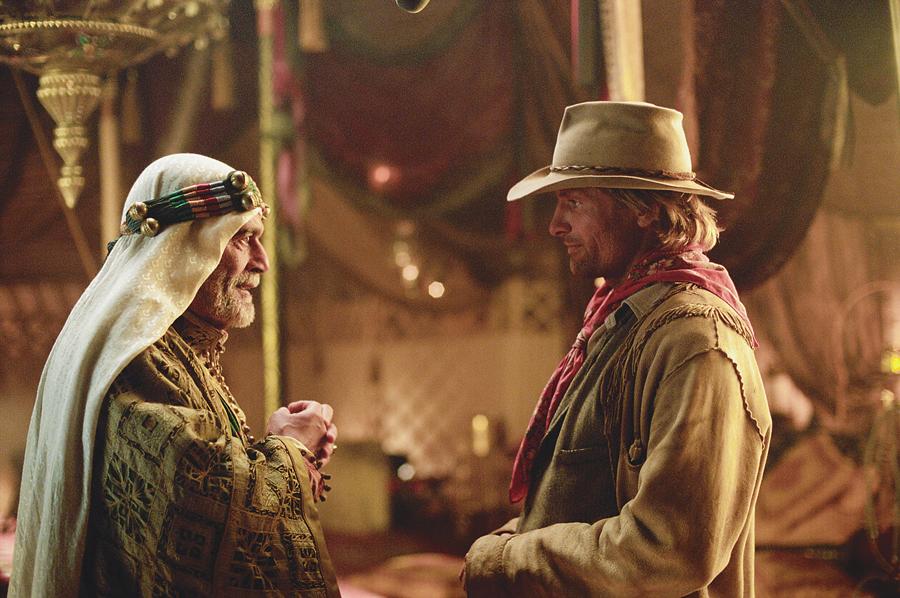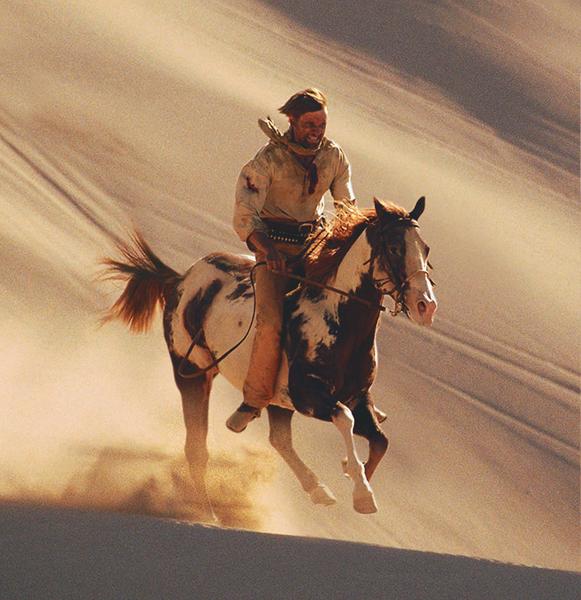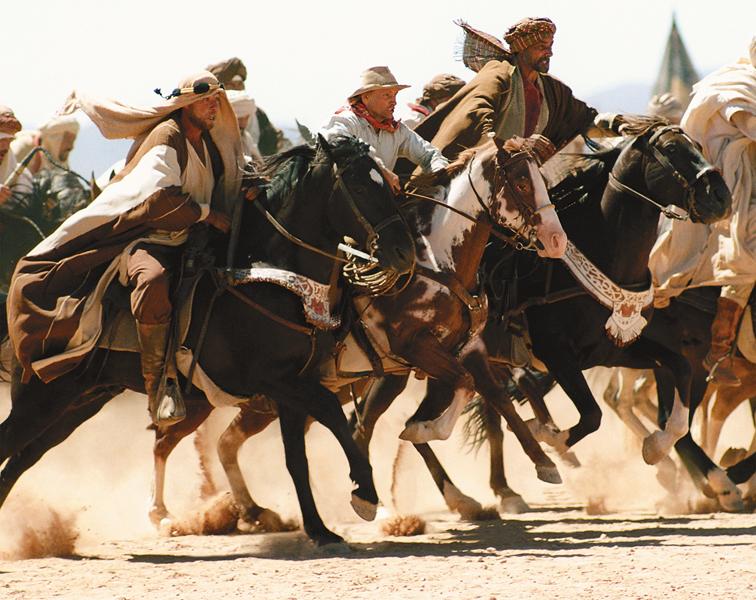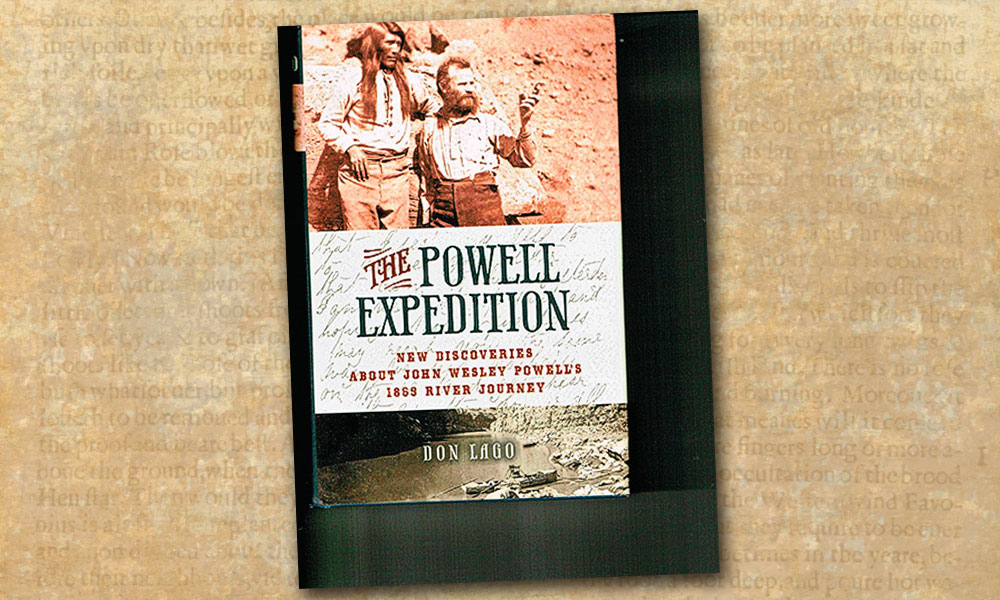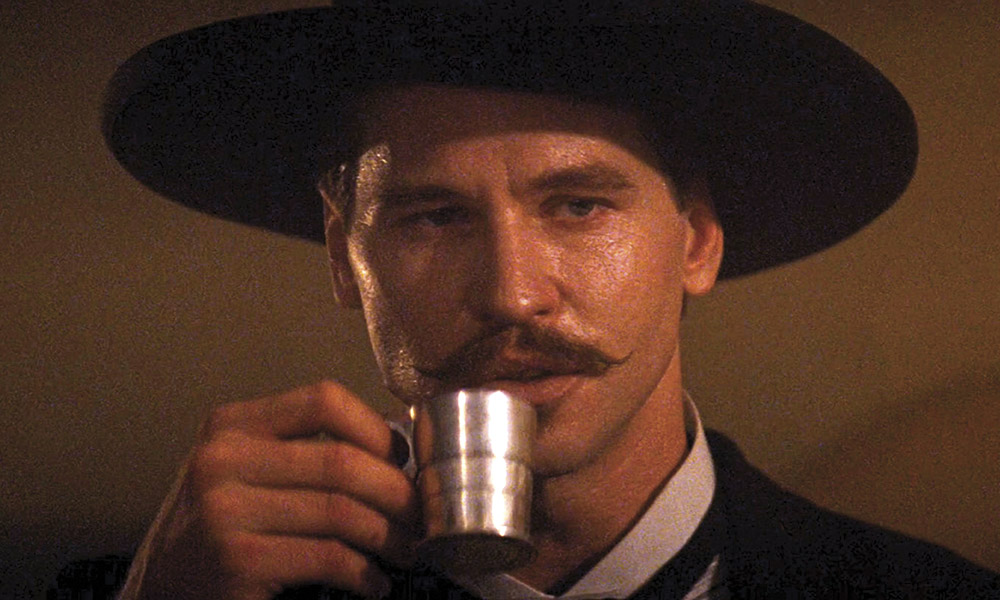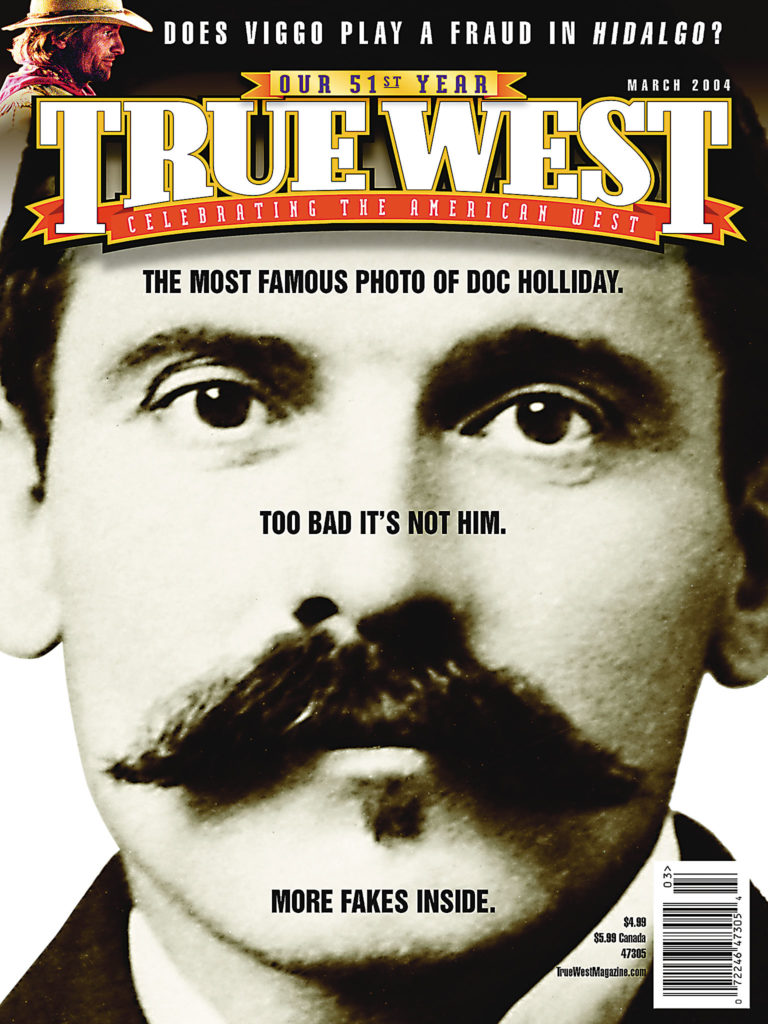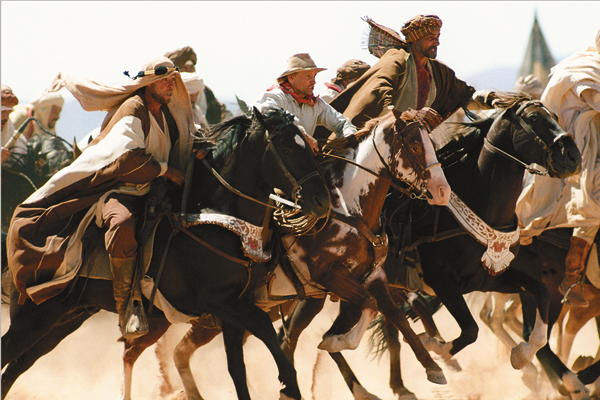 Hidalgo- In case there’s any question that history and the Old West are again “hot” in Hollywood, Disney’s Touchstone Pictures is releasing an $80 million film, not on one of the icons of the era—not on Wyatt or Billy or Doc or even Annie—but on a character few have ever heard about.
Hidalgo- In case there’s any question that history and the Old West are again “hot” in Hollywood, Disney’s Touchstone Pictures is releasing an $80 million film, not on one of the icons of the era—not on Wyatt or Billy or Doc or even Annie—but on a character few have ever heard about.
Noted screenwriter John Fusco has penned the script for Hidalgo, the legend of Frank Hopkins and his mustang, Hidalgo. Viggo Mortensen (Lord of the Rings) plays Hopkins, portrayed as one of the greatest long riders in equestrian history—his claim to fame was supposedly arriving 13 days early in a monthlong race from Galveston, Texas, to Rutland,Vermont, in 1886.
That feat is referred to in the movie, but the heart of the picture is Hopkins and Hidalgo enduring and winning a cross-country, 3,000-mile race on the Arabian Peninsula in 1891.
You can just see the scenes now; what a wonderful story; how incredibly visual; how spectacularly mano a mano with man and horse enduring all and carrying forward and well, it’s easy to see how Touchstone Pictures was touched by this story.
So why are some horse enthusiasts and historians saying it’s all bunk—that neither famous race ever actually happened, and that Hopkins was a braggart and exaggerator whose “true life story” isn’t worth a moment of screen time?
Touchstone Pictures has bounced around on its claims, starting off saying the film was “based on a true story” when it was promoting the October 2003 release. Then, with all the controversy surrounding the hero of the film and whether or not his story was true, Fusco says the phrase was cut. But in Touchstone’s final movie pitch for the March 2004 release, the studio goes all the way back—not only to saying the movie is “based on a true story” but now claiming it is “an incredible true story.” Hidalgo is hyped as “Unbridled. Unbroken. Unbeaten.”
Fusco says that even though the trailers have not been changed, the movie itself and all print advertising for the movie will not use the phrase. But it begs the question, what do those omittances matter when the trailer still leaves the audience believing the story is true?
The Hopkins Hoax
The Long Riders’ Guild—“the world’s first international association of equestrian explorers”—was commemorating the honor of being invited to join the Royal Geographical Society in London. So the members set out to publish a special version of their website to honor the “historical long riders,” some of whom are enshrined in legend, like Jonathan Swift, whose ride across Ireland inspired Gulliver’s Travels.
The guild naturally found the name Frank Hopkins, because various accounts, from his own biography to newspaper and magazine articles, claimed he had won 400 endurance races across the United States and also the legendary ride in Arabia, and that these achievements led Buffalo Bill Cody to hire him to ride with the Wild West Show.
CuChullaine O’Reilly of the Guild said he tried to verify these claims but could find no documentation for any of them. “We uncovered a whole slew of equestrian lies,” he contends, and named his web page “The Hopkins Hoax.”
He wasn’t the only one looking. So were historians in places where Hopkins’ races supposedly started or ended, both here and abroad; so were officials who specialize in Buffalo Bill; so were historians trying to track Hopkins’ life. None came up with anything to substantiate the Hopkins story.
O’Reilly’s website includes these comments:
“We don’t know what fort Hopkins was born at but it wasn’t Fort Laramie like he claims.”
—Louise Samson, Fort Laramie Historical Association
“The idea of a historic long distance Arab horse race is pure nonsense.”
—Dr. Awad Al-Badi, director of research at the King Faisal Center for Research and Islamic Studies
“We referenced every newspaper between 1889 and 1890, but there is absolutely no mention of Frank Hopkins or a race from Galveston to Vermont.”
—Casey Greene, Rosenberg Library, Galveston, Texas
“We were unable to find any Frank T. Hopkins in our database of known cast members, acquaintances, employees or friends of Colonel Cody.”
—Juti Winchester, curator of the Buffalo Bill Historical Center
“Based on the evidence, I’d say Hopkins was a fraud.”
—Brian Shoves, Montana Historical Society
“We have been unable to substantiate any of the facts you sent me regarding the life of Frank T. Hopkins.”
—Eric Robinson, New York Historical Society
“The only endurance Hopkins ever did was with his pencil.”
—James Davidson, past president of the Rutland (Vermont) Historical Society
O’Reilly concludes that Hopkins was not the great endurance rider of the Old West, but “he had undoubtedly been one of America’s most talented and enduring liars.”
The Long Riders’ website now blasts the movie as “Unbridled. Unbroken. Unbeaten. Untrue.”
Fusco stands firm
Screenwriter John Fusco says he first found out about his obscure hero while researching American Indian horses. “The old-time mustangers all knew of him,” he notes. “But as obscure as he is, he was also written about for 70 years in books on mustang horse history.”
It was the kind of story a screenwriter couldn’t pass up, and the film was well into production when Touchstone alerted him that it was getting complaints about the veracity of the story.
“My first reaction was ‘who else in the world even knows about Frank Hopkins, let alone has the time to put such effort in trying to debunk him,’” Fusco remembers.
But the controversy has swirled ever since.
“The only way it’s affected me is that it’s helped me access lost writings on horsemanship and distance riding by Hopkins that have only made me more fascinated by the man,” Fusco says. “As far as Touchstone, they stand by the 70 years of published writings on Hopkins as a basis for a movie that they have chosen to make.
“It’s a free world: the debunkers can go out and make a movie about Hopkins sitting in a saloon telling fantastic lies and falling off his horse if they want. We’re not in the documentary business.”
Documentaries are “the true story” kind of film. His screenplay is “based on a true story.”
And Fusco is standing firm: “Frank T. Hopkins was a true-life figure and his accomplishments were acknowledged by respected horsemen who knew him and wrote about him. I based my screenplay on those accounts and also on the oral tradition that has survived in the mustang horse world in which I am very much involved.”
Then he asks this: “How much of Butch Cassidy and the Sundance Kid was absolutely true? But it’s a damn good Western. To paraphrase that great line: “This is the movies. When legend becomes fact … print the legend.”
And what about the lack of documentation?
“There is a very good reason why there are no contemporary accounts of Hopkins’ long-distance racing,” Fusco says. “The kind of racing he did was heavily monitored by the S.P.C.A. of the time. Endurance races were done with the same subterfuge as cockfighting, ratting and baiting. You are as likely to find coverage of cockfights in the sports pages of that era as you are of extreme endurance racing.”
Coming to Fusco’s defense is his old friend and True West contributing editor Paul Hutton. “This is a movie,” he stresses. “It’s idiotic to go to a movie to derive your history. The instant you put words in someone’s mouth, you are writing fiction. A movie is fiction.”
Hutton, a Western historian who has consulted on several Hollywood movies, says he’s surprised when they get anything accurate. “In the Plainsmen, the only accurate things were a Custer Civil War statue and the wallpaper—nothing else in the movie is accurate.”
He remembers a telling moment with a Hollywood executive when he was complaining about horribly distorting history: “Why don’t they just take Romeo and Juliet and give it a happy ending,” Hutton asked in exasperation. To which the Hollywood guy responded: “You say that like it would be a bad thing.”
Photo Gallery
– All photos by Richard Cartwright / Touchstone Pictures, Inc. –


